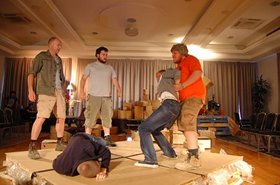Romeo has left fair Verona far behind to become Romek, a Polish cigarette smuggler smitten by a Cork beauty for whom he writes sensitive love songs. His would-be father in law is a Cork businessman now busily losing his mind as a financial house of cards tumbles down around himself and his family. Roundhouse Theatre Company, through the twin talents of Jennifer Rogers directing and Rachel Yoder writing, are very keen to engage with the changing face of contemporary Irish society. In order to do so they have chosen to change the face of Shakespeare’s celebrated love story.
Their approach is high on concept. There is a palpable sense of excitement about registering the changes in Irish society on the bard’s text. Rather than any slavish adherence, Roundhouse’s work becomes a loose and free interpretation. The creative juices pour into notching up so many fresh departures from the original. There are scenarios for Julie wanting to be a dancer; Romek works on the buildings and has some clandestine work on the side but he yearns to be a singer-songwriter; and there are the friendships and criminal affiliations with some local lads.
While several imaginative possibilities are set in train by Yoder’s script that are followed up in plotlines, it is punching well below the weight of the ambition. Part of the problem rests with the acting which is of an  uneven quality. Grief is laid on with too many histrionic affectations and the villainy is arch-baddy material. Fortunately, there is chemistry between Janusz Flakusz and Jane Moriarty in the title roles and they do look good together.
uneven quality. Grief is laid on with too many histrionic affectations and the villainy is arch-baddy material. Fortunately, there is chemistry between Janusz Flakusz and Jane Moriarty in the title roles and they do look good together.
But even taking the core of the play – the love between two young people – there is a problem. Of course it is easier to represent a bloody good row on stage than it is to catch the nuances of first love, but even allowing for that there is a syrupy quality to the love. Even the jaded among us need to be stirred by the love between the two. We don’t truly identify with them, partly because the play fails to catch the knowingness that goes with contemporary young people: their innocence seems to be of another time.
The programme refers to the process of devising the work and it does have that feeling of having emerged from the workshop floor. When it works, it has a sense of cinematic method acting but generally the tone is flattened so that it comes across like a TV soap opera where the language lacks that buzz of energy and originality. Janusz Flakus and Sinéad Donnachie have created a sad and soft-focused theme tune that would have been more effective had it been used more sparingly.
Jennifer Rogers' direction is undoubtedly sensitive but too often the drama becomes slow and ponderous and the director could have done with applying a whip-hand to the action as well. Rogers opted to open acts one and two with a piece of recorded video; it would have more engaging had these sequences been played out in front of us. Designer Sophie Connon made good use of the  playing spaces available to her in what was a typical hotel function room, by creating three split level playing areas, notably a café, a storeroom and the main playing area which doubled as an office and domestic space. Rather than being overly fussy these spaces were evoked with an economy of well-chosen objects. However, the design was always working against the space, as it was hard to get past the fact that we were in a hotel. A loud buzzing sound from the on-floor lighting also militated against suspending disbelief.
playing spaces available to her in what was a typical hotel function room, by creating three split level playing areas, notably a café, a storeroom and the main playing area which doubled as an office and domestic space. Rather than being overly fussy these spaces were evoked with an economy of well-chosen objects. However, the design was always working against the space, as it was hard to get past the fact that we were in a hotel. A loud buzzing sound from the on-floor lighting also militated against suspending disbelief.
One could get over such technical issues, including the space that was chosen for the piece. More problematic was the lack of development of the script from its original premise.
It is undoubtedly a labour of love by all of those involved and a creative attempt to engage with the changing face of contemporary Irish society. But any play has to create its own terms of reference and then get cracking on becoming as good a work as it is possible to be. Romek and Julie leans too heavily on Romeo and Juliet, not for its language, scenes or characterisation but for its credibility. The play needs to stand on its own merits. Take away all knowledge of the original and what is left is a rickety dramatic structure supporting thin dialogue and sketchy characterisation.
Liam Heylin is a playwright, and works as a journalist for the Irish Examiner. His play, Gdirl from Gdansk, was staged in Washington by Keegan Theatre in March 2010.